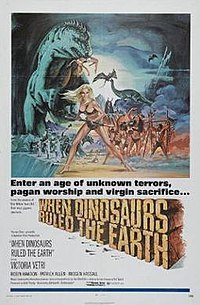by neufer » Thu Aug 14, 2008 8:17 pm
emc wrote:neufer wrote:Bet we wouldn’t be so enamored with meteors if dinosaurs still ruled the earth.

I've just stopped thinking about meteors altogether!
"neecha" = "stop"
<<Perseus stopped in the Phoenician kingdom Ethiopia, ruled by King Cepheus and Queen Cassiopeia. Cassiopeia, having boasted herself equal in beauty to the sea Nereids, drew down the vengeance of Poseidon, who sent an inundation on the land and a sea-monster, Ceto, which destroyed man and beast. The oracle of Ammon announced that no relief would be found until the king exposed his daughter Andromeda to the monster, and so she was fastened to a rock on the shore. Perseus slew the monster and, setting her free, claimed her in marriage.>>
----------------------------------------------------
<<When Dinosaurs Ruled the Earth is a 1970 movie starring Victoria Vetri. A small tribe is struggling to survive by giving a sacrifice of a blond woman to their gods in return for protection from the giant lizards looking to snack on them. Sanna, one of the sacrificial offerings, finds herself on her own when a freak storm interrupts the ceremony. As she searches for a safe haven she encounters hostility from rival tribes and lots of huge and very hungry dinos. The special effects are considered a benchmark in stop-motion animation believability, so much so that the film is referenced in the movie Jurassic Park.>>
http://www.imdb.com/title/tt0066561/
A 27-word "caveman language" was devised for this movie, supposedly drawing on Phoenician, Latin, and Sanskrit sources. Some of the key words in this language are:
"neecha" is "stop" or "come back";
"zak" is "gone" or "left";
"akita" is "look" or "see";
"neecro" is "bad" or "evil";
"m'kan" is "kill" or "killed";
"mata" is "dead";
"yo kita" is "go".
[quote="emc"][quote="neufer"]Bet we wouldn’t be so enamored with meteors if dinosaurs still ruled the earth.[/quote]
[img]http://upload.wikimedia.org/wikipedia/en/thumb/7/70/When_dinosaurs_ruled_the_earth.jpg/200px-When_dinosaurs_ruled_the_earth.jpg[/img][/quote]
I've just stopped thinking about meteors altogether!
"neecha" = "stop"
<<Perseus stopped in the Phoenician kingdom Ethiopia, ruled by King Cepheus and Queen Cassiopeia. Cassiopeia, having boasted herself equal in beauty to the sea Nereids, drew down the vengeance of Poseidon, who sent an inundation on the land and a sea-monster, Ceto, which destroyed man and beast. The oracle of Ammon announced that no relief would be found until the king exposed his daughter Andromeda to the monster, and so she was fastened to a rock on the shore. Perseus slew the monster and, setting her free, claimed her in marriage.>>
----------------------------------------------------
<<When Dinosaurs Ruled the Earth is a 1970 movie starring Victoria Vetri. A small tribe is struggling to survive by giving a sacrifice of a blond woman to their gods in return for protection from the giant lizards looking to snack on them. Sanna, one of the sacrificial offerings, finds herself on her own when a freak storm interrupts the ceremony. As she searches for a safe haven she encounters hostility from rival tribes and lots of huge and very hungry dinos. The special effects are considered a benchmark in stop-motion animation believability, so much so that the film is referenced in the movie Jurassic Park.>>
http://www.imdb.com/title/tt0066561/
A 27-word "caveman language" was devised for this movie, supposedly drawing on Phoenician, Latin, and Sanskrit sources. Some of the key words in this language are:
"neecha" is "stop" or "come back";
"zak" is "gone" or "left";
"akita" is "look" or "see";
"neecro" is "bad" or "evil";
"m'kan" is "kill" or "killed";
"mata" is "dead";
"yo kita" is "go".